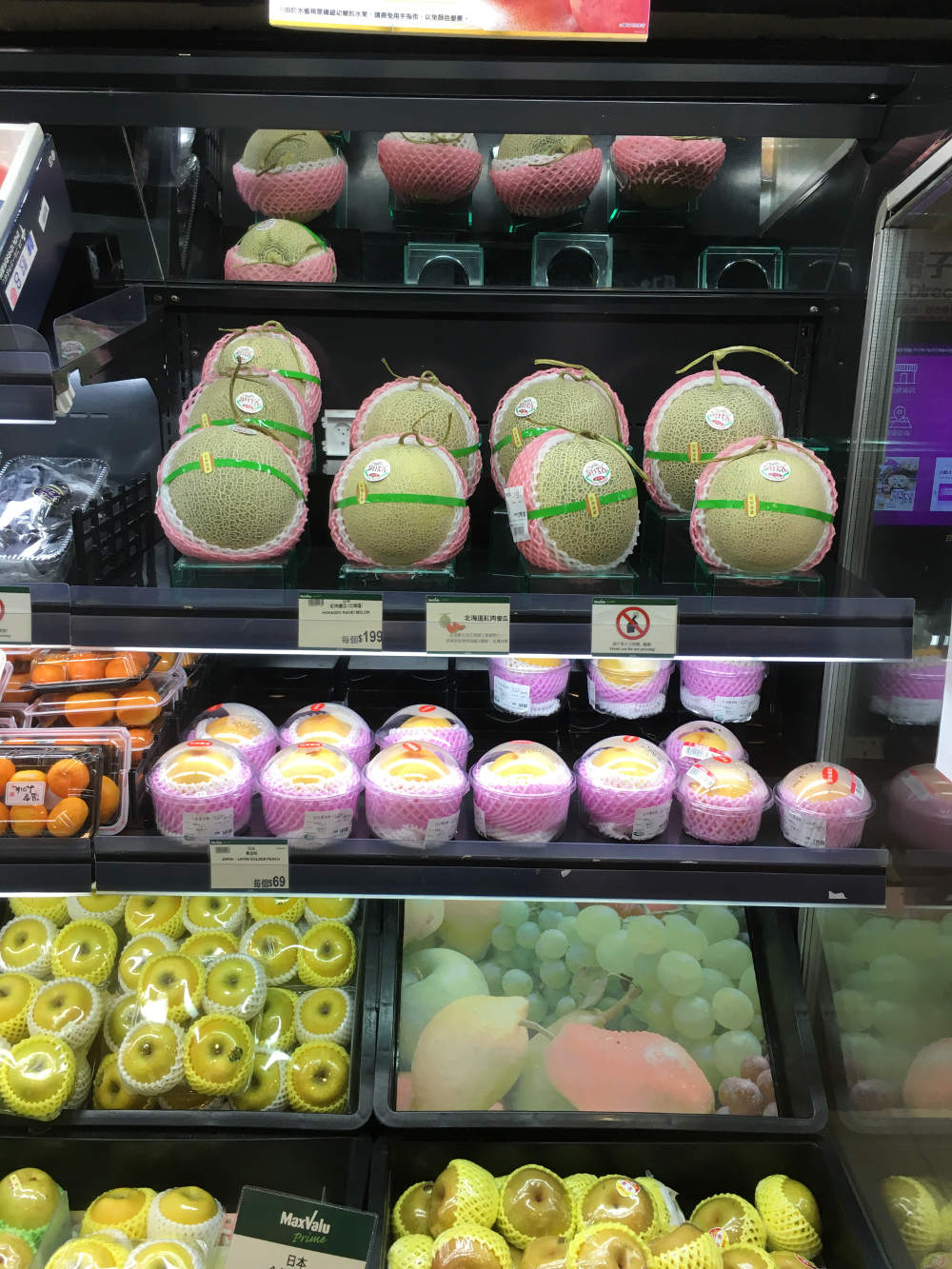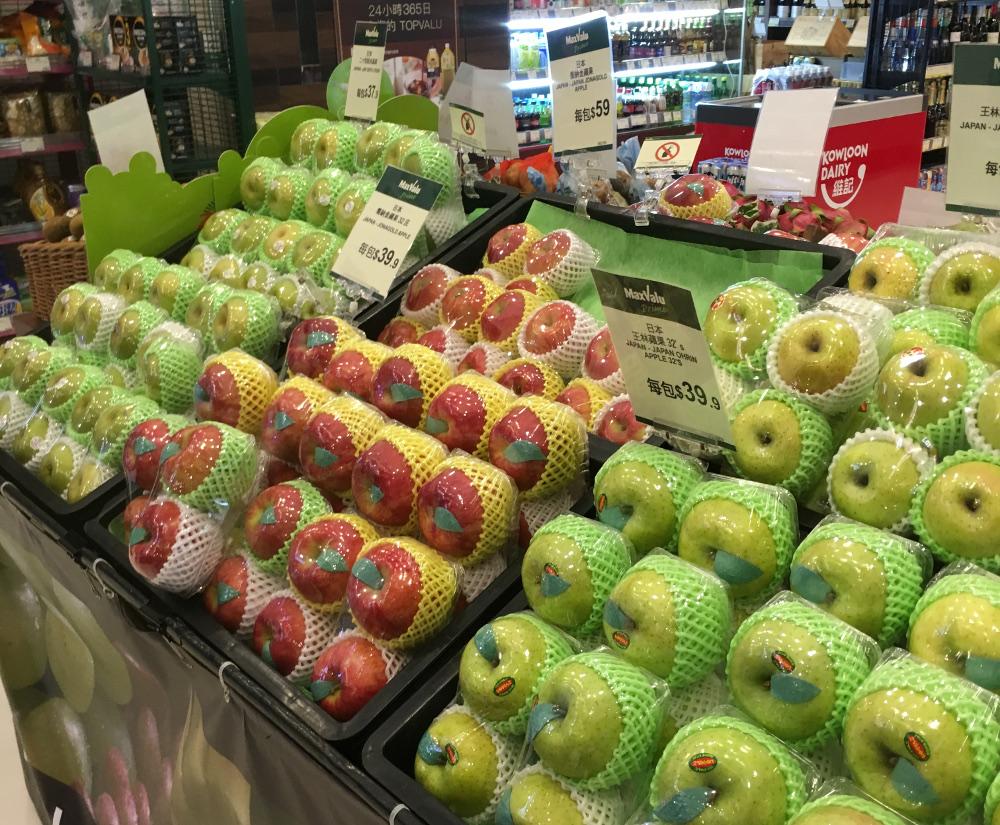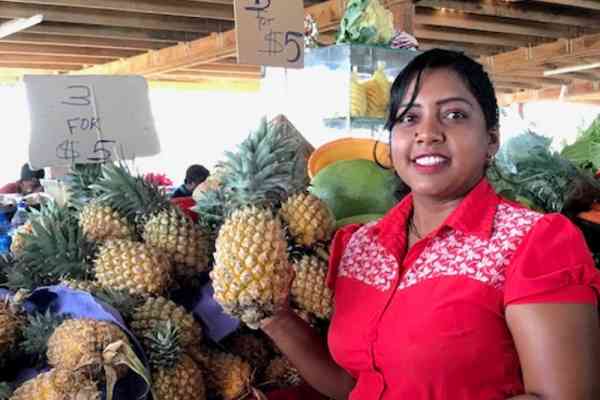
Three Fijian exporters received a unique opportunity to take part in Asia’s leading fruit and vegetable trade event when they participated in the Asia Fruit Logistica Tradeshow in Hong Kong from 6-8 September, 2017. The three, Mohammed Ifraaz from the Biosecurity Authority of Fiji, Rizwan Khan from Pacific Harvest Ltd and Ashleen Prasad from Farmboy were supported by the “Improvement of Key Services to Agriculture” (IKSA) project, financed by the European Union (EU) and managed by the Pacific Community (SPC).
Mohammed Ifraaz, Mr Khan and Ms Prasad were in Hong Kong for five days, three of which were spent attending the trade show, with the remaining two days spent visiting some of Hong Kong’s main retail supermarkets and fresh produce markets to track imported produce and assess the possibilities of entry of Fijian fresh fruit and vegetables into the Asian market. The Fiji participants also explored research standards and regulatory requirements for fresh produce entering the Asian market, networked with potential buyers, importers, exporters, service providers, equipment manufacturers and packaging suppliers.
We spoke with Rizwan Khan and Mohammed Ifraaz about their experience at the Trade Show.
"Mohammed Ifraaz ", "Biosecurity Authority ", "Fiji"
“The trade show was very informative and useful in terms of finding new markets (for importers) who are interested in buying Fijian products and identifying products they are actually interested in such as mango, pineapple, eggplant and breadfruit. It was a platform to exhibit products and attract buyers. It also allowed us to observe how other countries who showcased their products and hear their experience in setting up their booth,” Mohammed Ifraaz explained.
“The Asian market holds potential and that was determined after interaction with vendors and importers who currently import from neighboring countries such as Thailand and Vietnam. There are also opportunities for Fijian exporters and farmers as well. There was huge interest shown on the import of eggplant, breadfruit, mango, papaya etc. We also identified some key problems and techniques that could be used to extend the shelf life of Fijian export products,” Mohammed Ifraaz said.
Produce on display at the Asia Fruit Logistica trade show in Hong Kong in September

Some of the key challenges which the Fiji participants felt would need to be overcome in order to trade with the Asian Market include such issues as distance and travel time between Fiji and Asia, volume and constant supply to importers, guaranteed payment to Fiji exporters and biosecurity and quarantine standards.
Mohammed Ifraaz said that he would highly recommend Fijian exporters attend the 2018 trade show as “it provides a very good opportunity to showcase your products and even make deals at the same time by meeting interested buyers face to face. But the key constraints such as quarantine requirements and distance between Asia and Pacific markets must taken into account,” he said.
Rizwan Khan from Pacific Harvest Ltd is a local exporter who currently supplies a client in Hong Kong with a ton of fresh papaya every week.
"Rizwan Khan", "Local exporter", "Pacific Harvest Ltd "
Sharing his experience after the tradeshow, Mr Khan said: “There was a lot to cover and we visited many stalls from various countries who showcased fresh produce, machinery, preservation of fresh produce materials, processing equipment and logistics. We also met freighting solution providers and attended information sharing sessions."
“Overall, it was very informative – on a very large scale. Fiji caters for a very specific smaller market size. From the import side, we mostly get our fresh produce imports such as tomatoes, fruits, potatoes and onions from New Zealand and there are a few importers who are doing this. The Asia Fruit Logistica allowed us to experience better quality and new varieties of produce, which if imported, would increase the sale prices. In addition to this, the cost of freight would add significantly to the overall cost as well – this would rule out importing countries from north of the equator till a direct route with two stopovers were found,” he explained.
“A direct route is being explored and could be a possibility within the next few years given the urgency of China’s ‘belt road’ initiative. Exporting of fresh produce has opportunities – the opening of the China–Fiji pathway would lead to requests of fresh produce from Fiji to meet China’s growing appetite for cleaner and fresher produce as their mid-tiered income raises and wealthier Chinese accumulate more wealth. We received many requests for this and were also asked to inquire with the Fijian government about the status of the Fiji-China bilateral talks held some while back and the progress of the pathway for trade,” he said.
“The show was very informative – we got to see better fruits and vegetables grown under optimum conditions and methods. We exchanged ideas on better storage and shelf-life packing material products, saw processing equipment first-hand that could help us better process our produce and got introduced to possible importers. For this show, yes, I felt that our required 30 percent return on investment was met.”
“The Asian markets are very specific in their needs and what they perceive as quality of fresh produce – they are very particular on packaging and uniformity – something where Fiji is perhaps a few years behind. Nevertheless, the freight factor is very important, especially for airfreight and it needs to be carefully considered before any Fijian exporter commits to importers from Asia. The fresh produce markets in Hong Kong are all about quality packaging and appeal – the colour, display and consistency of fruits is very important.”
Mr Khan said that the Chinese market offers Fiji a lucrative opportunity, however, he said that farmers and exporters would have to be well prepared before entering this market.
“The fruit has to be optimum,” he explained. “In Fiji, we have a serious issue of anthracnose disease which leaves blotches of black spots on fruits which makes is very unappealing. We need to work on a very good spray schedule and get the right chemicals to combat this in order to be able to make in- roads with fruit appeal for Asian markets. Handling of fruit from the farmgate to exporters packaging sheds and then exporting them needs to be worked on and new equipment invested in to ensure we don’t get the bumps and indents on fruits in the transit stage. Fruit stocks need to be a necessity. Most importantly, we need to ensure our packaging material is of very good quality,” he advised.
Mr Khan said that he managed to “pick up a few orders” while in Hong Kong.
“Perhaps we could pick up orders along the way but for a larger and more consistent volume. The China trade pathway would hold the key to this and then we need to work on colour consistency and ensuring that our fresh produce doesn’t contain blemishes. Size consistency and really good packing and packaging materials are also important in order to supply the Asian market,” he said.
“I strongly suggest that the Fijian Government be implored to fast-track the bilateral agreement with Fiji and China and get the pathway opened so that this can provide more meaningful engagement with prospective clients in the Asian market and we could talk serious business then,” he said.

